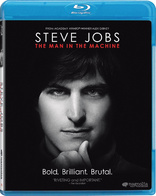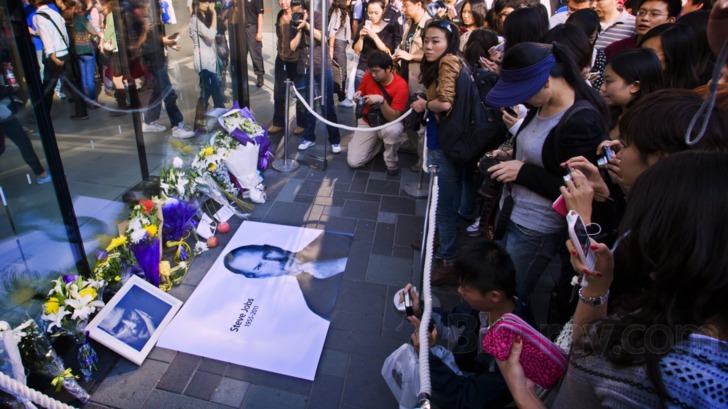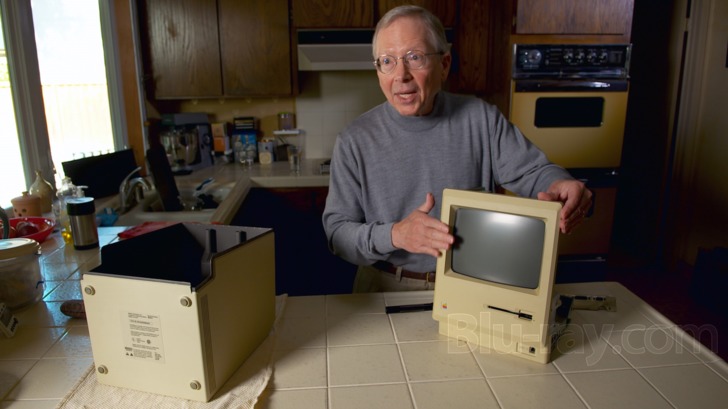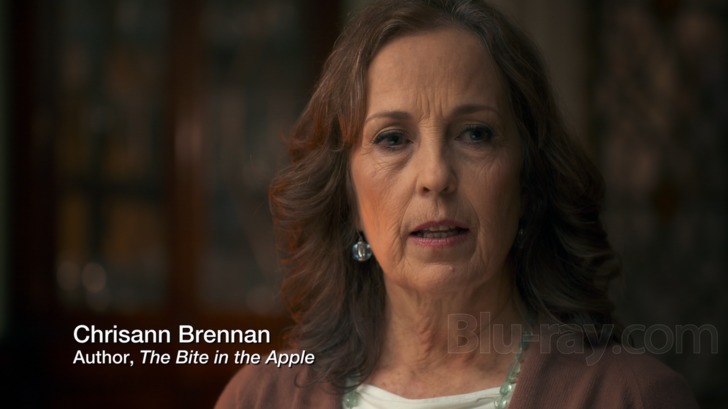Steve Jobs: The Man in the Machine Blu-ray Movie
HomeSteve Jobs: The Man in the Machine Blu-ray Movie 
Magnolia Pictures | 2015 | 128 min | Rated R | Mar 15, 2016
Movie rating
6.5 | / 10 |
Blu-ray rating
| Users | 0.0 | |
| Reviewer | 3.0 | |
| Overall | 3.0 |
Overview
Steve Jobs: The Man in the Machine (2015)
This documentary portrait examines the founder and face of Apple Computer, seeking to unravel the mystery of Jobs's ability both to innovate and to create unparalleled loyalty among Apple's customers and fans.
Starring: Steve Jobs, Steve Wozniak, Alex Gibney, Nolan BushnellNarrator: Alex Gibney
Director: Alex Gibney
| Biography | 100% |
| Documentary | 47% |
Specifications
Video
Video codec: MPEG-4 AVC
Video resolution: 1080p
Aspect ratio: 1.78:1
Original aspect ratio: 1.85:1
Audio
English: DTS-HD Master Audio 5.1 (48kHz, 24-bit)
Subtitles
English SDH, French, Spanish
Discs
50GB Blu-ray Disc
Single disc (1 BD)
BD-Live
Playback
Region A (B, C untested)
Review
Rating summary
| Movie | 2.5 | |
| Video | 4.0 | |
| Audio | 4.0 | |
| Extras | 2.5 | |
| Overall | 3.0 |
Steve Jobs: The Man in the Machine Blu-ray Movie Review
Still Searching
Reviewed by Michael Reuben March 15, 2016A month after the Blu-ray release of Steve Jobs,
Danny Boyle's bio-pic about the founder of
Apple Computer, comes the documentary Steve Jobs: The Man in the Machine from another
Oscar-winning filmmaker, Alex Gibney (Enron: The Smartest Guys in the Room, Taxi
to the
Dark Side). Despite their common subject, the two films could not be more different. Boyle's
film, with its screenplay by Aaron Sorkin and Oscar-nominated performances by Michael
Fassbender and Kate Winslet, attempted to capture the multi-layered, often infuriating
personality behind the public persona. Gibney is after something different. His film compares the
public persona to the reality, and his focus is less on Jobs the man than on the tech guru who
became the familiar face of Apple.
Gibney has said that he borrowed the structure of The Man in the Machine from Citizen Kane,
casting himself in the role of the reporter who tries to understand an influential man by
interviewing those who knew him. But Gibney had considerably less access to key individuals
than the reporter in Kane. Apple co-founder Steve Wozniak appears only in archival interviews.
Central figures such as former Apple CEO John Sculley, with whom Jobs waged an epic battle for
control of the company, and current CEO Tim Cook are almost wholly absent. No family
members participated, with the sole exception of Jobs's former girlfriend Chrisann Brennan, the
mother of his daughter Lisa (whose paternity Jobs tried to dispute). Restricted to the fringes of
Jobs's circle, Gibney must resort to industry journalists and commentators to fill out a portrait
that he himself has called "impressionistic". Although some of the new interviews are
fascinating, and Gibney's research team has unearthed intriguing but little seen footage of Jobs
himself, Gibney's account is unable to locate a "Rosebud".

Gibney opens The Man in the Machine with images of mourners piling flowers in front of Apple stores, along with Tweets and video blogs by grieving fans, following the announcement of Jobs's death from cancer in October 2011. Why did a maker of digital devices provoke the kind of worldwide outpouring of emotion usually reserved for beloved entertainers or inspirational leaders? What was it about Steve Jobs that touched so many people?
The search for answers takes Gibney through territory that will be familiar to anyone who has followed Apple over the years. Thus, we begin with Jobs's early collaboration with Steve Wozniak that led to Apple's creation (in Jobs's Los Altos garage, according to legend), followed by the company's success with the Apple II, the introduction of the Macintosh (with its famous Super Bowl spot based on George Orwell's 1984 and directed by Ridley Scott) and Jobs's ouster from Apple following his conflicts with CEO John Sculley. Then comes NeXT, Inc., which Jobs founded and eventually sold back to Apple in a triumphant return to his former position, where he restored the company's reputation with the iMac and drove its fortunes to new heights with the iPod, iTunes and the iPhone. Along the way, Jobs also bought and built up Pixar, which he later sold to Disney.
The portrait that emerges from Gibney's interviews is that of a driven entrepreneur who was single-minded, ruthless and frequently cruel. While these qualities are not uncommon among ambitious people, Gibney is fascinated by how Jobs cloaked such behavior with a counter-cultural disguise epitomized by the famous "Think Different" campaign, with its images of rebels like Gandhi, Caesar Chavez and Martin Luther King. As Gibney has said in an interview: "In some fundamental way, Jobs' genius was making people think that Apple stood for the world's best values when it often represented the worst. . . . He traded his ties for turtlenecks, loaded up his iPod with rock 'n roll, and looked to a Zen master as his spiritual advisor. But when it came to values, Jobs was more like Ayn Rand than Rosa Parks, more Milton Friedman than Martin Luther King, more Machiavelli than Gandhi. He followed the path of the bull market, not Buddha. . . . Rather than accepting that we are all 'one', [he] seemed more interested in looking out for Number One."
The problem with this approach is that it equates Jobs's personal life with his corporate career, and while the two are obviously connected, they are not interchangeable. Gibney catalogs the usual list of Apple's sins, including its use of cheap Chinese labor, its parking of profits abroad to avoid taxes and its issuance of backdated stock options to select executives, including Jobs. But except in the case of the stock options, which Gibney acknowledges was a common practice in Silicon Valley and about which Jobs was questioned by the SEC (and denied knowledge of any improprieties), Gibney does not address the extent to which Jobs himself was responsible for these corporate maneuvers. If nothing else, Jobs's removal from Apple in 1985 should demonstrate how difficult it is for one man to dictate company policy, even when he's the company's public face. More significantly, Gibney doesn't seem to draw a distinction between personal failings, such as Jobs's harsh treatment of colleagues and subordinates, and the behavior of a business organization run by officers and directors and answerable to its shareholders. There are plenty of gentle, polite, well-behaved businesspeople who, unlike Jobs, cannot be criticized for failing to support their children, refusing to give to charity or routinely parking in handicapped spaces. That doesn't guarantee the businesses they operate won't compete ruthlessly and cut corners wherever possible. Organizations operate according to their own internal logic, and by repeatedly blaming Jobs for actions of Apple, Gibney falls victim to the very illusion his film purports to unmask, namely that the man and the company were one and the same.
Gibney does touch on a more intriguing theme that would be well worth further exploration. Jobs devoted all his energy to developing and promoting devices to connect people to one another, while at the same time he struggled with personal connections in life. The same tension frequently occurs among artistic figures whose imaginations touch millions but whose private lives are a wreck, and the Jobs that emerges from Gibney's portrait seems more like a temperamental artist than a tough businessman. Though Gibney raises some provocative questions, in the end his subject remains elusive.
Steve Jobs: The Man in the Machine Blu-ray Movie, Video Quality 

Like many contemporary documentaries, Steve Jobs: The Man in the Machine is a combination
of new interviews and archival footage of varying quality. The credited cinematographers are
Sam Painter (who previously worked with Gibney on Going Clear: Scientology and the Prison of
Belief) and Yutaka Yamazaki (After Life). The disparate
materials have been harmonized on a
digital intermediate, from which Magnolia's 1080p, AVC-encoded Blu-ray has presumably been
sourced by a direct digital path. The new interviews are first-rate hi-def images with excellent
detail, contrast and color, while the many images from old home movies and videotape have low
resolution and frequent glitches. However, these are source-based issues and no fault of the Blu-ray.
Magnolia has encoded The Man in the Machine at a generous bitrate of 29.99 Mbps, which
allows plenty of bandwidth for the more troublesome portions taken from sources of poor
quality. Artifacts were not an issue.
Steve Jobs: The Man in the Machine Blu-ray Movie, Audio Quality 

The Man in the Machine's 5.1 soundtrack has been encoded in lossless DTS-HD MA. As with most documentaries, the voices of interview subjects are the main focus, along with Gibney's off-camera questions. All of the interviews are clear and intelligible, as is the voiceover by Gibney and, occasionally, other subjects (e.g., an actress who serves as the voice of Jobs's daughter, Lisa, by reading a memoir she wrote about her father). The surrounds are limited to supporting the musical score, which is credited to Will Bates (Lola Versus). As in Danny Boyle's Steve Jobs, the soundtrack is sprinkled with songs by Bob Dylan, one of Jobs's touchstones. The Rolling Stones' song "She's a Rainbow" serves as an effective accompaniment to the segment on the iMac.
Steve Jobs: The Man in the Machine Blu-ray Movie, Special Features and Extras 

- Deleted Scenes (1080p; 1.78:1; 31:13): A "play all" function is included. The most interesting scenes involve commentators whose interviews did not make the final cut, e.g. Richard Stallman, founder of the Free Software Foundation.
- Buying the iPhone 5s
- Beautiful Shiny Jails
- Digital Lockdown
- Japan Design
- The Monks of Elhei-Ji
- Foxconn Visit
- Jobs Deposition—False Board Meeting Minutes
- Visiting Steve at Home
- Steve Quits
- Piano and Living with Steve
- Hearing About Steve
- Interview with Director Alex Gibney (1080p; 1.78:1; 9:55): Gibney describes the impetus for making the film, discusses how he approached the subject and reflects on larger themes of technology and corporate culture.
- Theatrical Trailer (1080p; 1.78:1; 2:16).
- Also from Magnolia Home Entertainment: The disc plays trailers for Drunk Stoned Brilliant Dead: The Story of the National Lampoon, Experimenter, The Lady in the Car with Glasses and a Gun and Synchronicity , as well as promos for the Chideo web service and AXS TV. These also play at startup, where they can be skipped with the chapter forward button.
- BD-Live: As of this writing, attempting to access BD-Live produces the message "Check for updates".
Steve Jobs: The Man in the Machine Blu-ray Movie, Overall Score and Recommendation 

Although Gibney has made an interesting contribution to the growing portraiture of Steve Jobs,
both written and cinematic, The Man in the Machine is a frustrating film, which too often
substitutes reflex value judgments for a detailed examination of the subject. Some segments,
especially the interview with Bob Belleville, a member of the Macintosh design team, and with
Chrisann Brennan, supply valuable perspective on Jobs's life and career, but at 128 minutes, the
film feels too long for such an "impressionistic" creation—to use Gibney's term—and too
episodic to cover the ambitious agenda that Gibney has set for himself. Worth seeing, but rent it.
Similar titles
Similar titles you might also like
(Still not reliable for this title)

The Armstrong Lie
2013

The Salt of the Earth
Le Sel de la Terre
2014

Loving Pablo
2017

Tesla
2020

Molly's Game
2017

The Founder
2016

A Cry in the Dark
Evil Angels
1988

Senna
2010

Whitey: United States of America V. James J. Bulger
2014

Talk to Me
2007

House of Gucci
2021

Mandela: Long Walk to Freedom
2013

Devil's Knot
2013

Hoffa
Filmmakers Signature Series
1992

Conviction
2010

Tupac: Resurrection
2003

Three Identical Strangers
2018

Don't Worry, He Won't Get Far on Foot
2018

The Front Runner
2018

Vice
2018